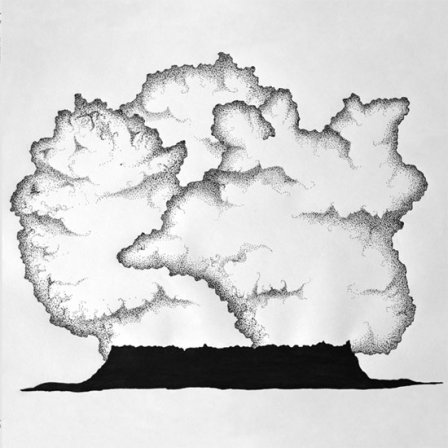The first thing one must realize about the music of Jon Porras is that it’s indelibly tied to the visual. It’s impossible to listen to his refined, meditative guitar style and not find it evocative enough to conjure vivid mental images of the bleak, unforgiving desert. In fact, through his work as Elm, as one-half of Barn Owl, and under his own name, Porras shows a singular fascination with not simply painting pictures of that solitary, arid landscape, but also animating them. It’s fitting then that he has taken to soundtracking films in the live setting and releasing a self-made, self-scored Super 8 film. In this way, Porras throws his lot in with a long tradition of artists across music, film, and literature who have found the American desert to be a vital, resonant setting for their art. The stark morality plays of Cormac McCarthy, the violent Spaghetti Westerns of Sergio Corbucci, and the lonely, hangdog guitar style of Neil Young are all traditionally influential signposts on which Porras hangs his hat.
Black Mesa is Jon Porras’ second full-length album under his own name, but it’s completely tied thematically to his previous work as Elm and to his collaboration with Evan Caminiti as Barn Owl. That conceptual unity is apparent on Black Mesa, where each song title is a rock-solid descriptor for the images it intends to conjure. “Into Midnight,” “Candlelight Mirage,” and “Embers At Dusk” all indicate a kind of pensiveness to do with obscured, potentially illusory scenes. Porras’ guitar on the album as a whole is both meditative and isolated, as concerned with finding water as with searching for the mystical in the ink-black desert night. Most of the tracks are virtually without percussion, beginning structurally with a guitar solo from which Porras elaborates with added guitar tracks, usually a wailing feedback that competes with the more delicate elements, as seen on tracks like “Desert Flight” and “Into the Black Mesa.” Overall, there is an overwhelming sense of drift and dread.
It would be negligent of me to not mention this nugget found in an interview with Porras: when asked how he likes his coffee, he cheekily references Dale Cooper, Kyle MacLachlan’s intrepid detective character from Twin Peaks, when he answers, “Coffee-black as midnight on a moonless night.” In fact, the sense of Lynchian lurking doom and weird noir is very strong here. If the songs on Black Mesa have a human protagonist, you have to wonder: Why are they there in the dark of the desert? What crime or unspeakably bad situation drove them there? In this context, Black Mesa succeeds as a soundtrack work without a film because it effectively conjures the landscape and the mood that Porras intends. And yet, the album as a whole falls short of offering us anything new or of exceeding quality in relation to either Porras’ other projects or the work of similarly-minded artists. Still, Black Mesa is an unmistakably effective, quality genre piece by an artist highly invested in the form.
More about: Jon Porras



